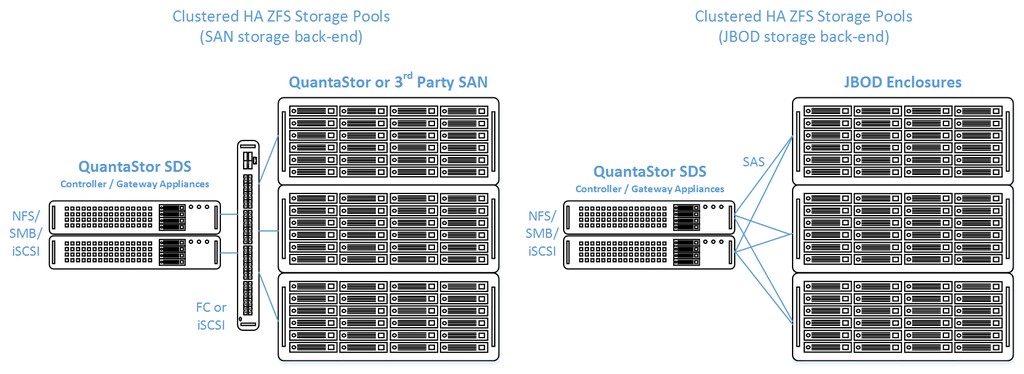Setup Guide for Clustered HA Storage Pools
Why Use a Clustered HA Storage Pool Configuration
QuantaStor's clustered storage pool configurations ensure high-availability (HA) in the event of a node outage or storage connectivity to the active node is lost. **Needs a little more flushout**
Requirements for a Clustered HA Storage Pool Configuration
Creating a QuantaStor Clustered HA Storage Pool will require:
- At least 2 QuantaStor appliances
- 2 network interfaces with separate networks for redundant cluster communication
- Shared storage available to all systems in the cluster
- SAS JBOD(s) or SAN-delivered block storage over Fiber-channel (preferred) or iSCSI
QuantaStor's High-Availability Storage Pool solution requires that the QuantaStor appliance cluster members all have access to the Storage Pool devices. Because of this requirement, the storage used for a HA Storage Pool must either be from a SAS JBOD enclosure capable of supporting multiple hosts, or for higher performance configurations, a SAN delivering block storage (LUNs) to the QuantaStor front-end appliances over FC (preferred) or iSCSI.
Storage Bridge Bay Support
Storage Bridge Bay (SSB) systems can be used to create a QuantaStor HA Cluster configuration in a single 2U rack-mount unit. The SSB units, referred to as a cluster-in-a-box, contain two hot-swap servers, and a shared JBOD all in a single unit. QuantaStor supports all SuperMicro based SBB units. For more information on hardware options and SBB please contact your OSNEXUS reseller or our solution engineering team at sdr@osnexus.com.
Back-end SAN (FC/iSCSI) Storage via QuantaStor Appliances
QuantaStor appliances can be used to provide SAN provisioned storage over Fiber-channel or iSCSI. Note that these systems would be separate from the HA Storage Pool cluster. You can see the How to Provision SAN(FC/iSCSI) Storage using QuantaStor Appliances for more details on how to set this up.
Configuration Steps
Configuration steps
Config Breakout Category 1
This is a sub config breakdown category 1. Think pre-setup.
Config Breakout Category 2
This is another sub config breakout. Think maybe installation.
Conf Breakout Category 3
Details on actual operation. From here use sub-headers for details when actually working with product.
Step Detail
This is a good step.
Step Detail
This is another step after that.
Step Detail
You liked that step. You'll love this step.
Wrapping Up
The best step of all.
Conf Breakout Category 4
Would you need anything after you finished? Maybe
Verifying Your Configuration
This is where we will want to provide steps (if any) to confirm that you did everything right.
Troubleshooting
Because nothing ever works right the first time.
